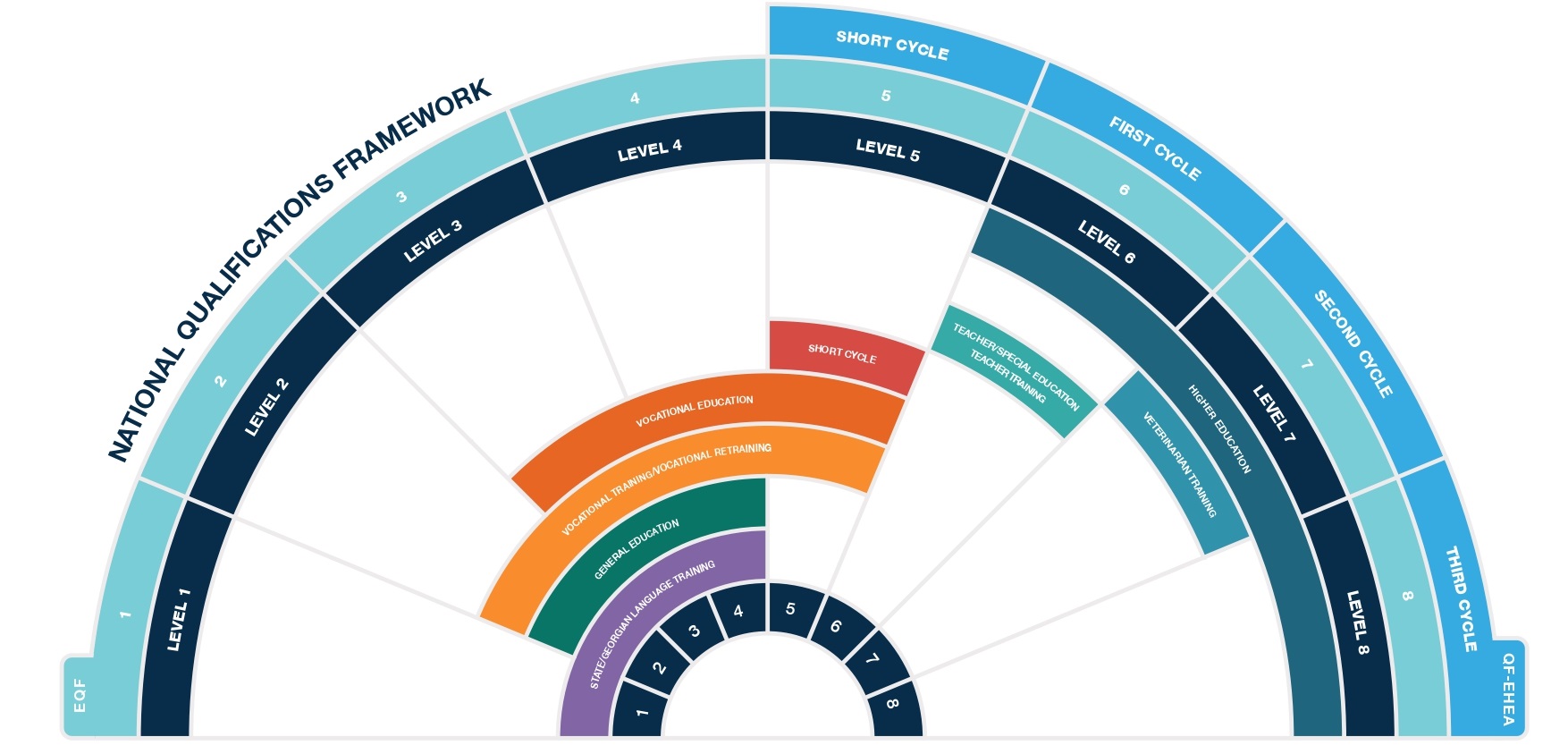
One of the goals of the National Qualifications Framework is to ensure the compatibility and transparency of qualifications at the international level. To achieve this goal, it is fundamentally important to align it with European Qualifications Frameworks. To do so, Georgia must undergo two key processes:
referencing (establishing the compatibility of the national framework with the European Qualifications Framework for Lifelong Learning, EQF LLL) and self-certification (determining the compatibility of the national framework with the Qualifications Framework of the European Higher Education Area, QF-EHEA).
It is worth noting that, as part of the referencing process with the European Qualifications Framework, a working group approved by the center’s director must develop a referencing report to facilitate the self-certification and referencing of the national qualifications framework. This should be done in collaboration with stakeholders and with the involvement of international experts. The report will then be submitted to the Advisory Group of the European Qualifications Framework. The report will analyze each level of Georgia’s education system in accordance with the following 10 criteria outlined in the recommendations of the European Parliament and the Council of Europe:
• Criterion N1: The functions and / or competencies of the national agencies involved in the referral process at the national level are clearly defined and made public;
• Criterion N2: There is a clear and visible link between the National Qualifications Framework or system levels and the descriptors of the European qualifications framework levels;
• Criterion N3: The National Qualifications Framework or system and its qualifications are based on the principle and purpose of learning outcomes and are linked to the possibility to recognize learning outcomes achieved through non-formal education and the credit system;
• Criterion N4: Procedures that provide for the reflection of qualifications in the National Qualifications Framework or describe the place of qualifications in the National Qualifications System are transparent.
• Criterion N5: The National Quality Assurance System (s) for education are linked to national qualifications frameworks or systems and are in line with quality assurance principles as described in Annex 4 of the Recommendation.
• Criterion N6: The referencing process must include the agreement of relevant quality assurance bodies, confirming that the referencing report aligns with national quality assurance mechanisms, standards, and practices.
• Criterion N7: The referencing process must involve international experts, and referencing reports must include written conclusions/statements from at least two international experts representing at least two different countries regarding the referencing process.
• Criterion N8: The responsible institution(s) shall approve the referencing of the national qualifications framework with the European Qualifications Framework. The comprehensive referencing report should reflect an assessment of each criterion, supported by well-founded arguments. The report should be published by the responsible institution/institutions, including the National Contact Point for the European Qualifications Framework. The same report can be applied to the European Higher Education Area Qualifications Framework for the self-certification process, in accordance with the self-certification criteria.
• Criterion N9: Within six months of completing or updating the referencing process, member states and other participating countries shall publish the referencing report and provide information on the relevant European portal for comparison purposes.
• Criterion N10: After completing the referencing process, all new documents related to qualifications that form part of the national qualifications framework or system, issued by a competent authority (e.g., certificates, diplomas, certificate supplements, diploma supplements) and/or included in the qualifications registry created by authorized bodies, must clearly reference the corresponding level of the European Qualifications Framework.
The self-certification process involves determining the compatibility of the national qualifications framework with the European Higher Education Area framework, with the participation of foreign experts. This is achieved through the development of a relevant report and the completion of required procedures. Upon successful completion of these procedures, the information is published on the European information portal, and the European Network of Information Centers and National Academic Recognition Information Centers (ENIC-NARIC Network) includes Georgia in the list of countries that have successfully completed the self-certification process. This, in turn, facilitates the recognition of these qualifications within the European Higher Education Area.
